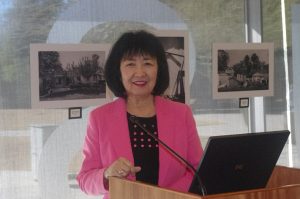
Story and photo by Joyce Coronel
Today this West Chandler neighborhood boasts an aquatic center and park, but in the early 1940s, a scant distance from Nozomi Park, a dark chapter was written—one that only recently has been brought into the light for examination, and, it is to be hoped, a lesson in humanity and justice.
Not far from the splashing in today’s pool and young athletes tossing softballs stood one of the 10 notorious relocation camps that held Japanese-Americans during World War II.
About 13,000 people were interned at what was then known as the Gila River Relocation Center. From May 1942 until February 1946, Japanese men, women and children lived in harsh desert conditions in Spartan barracks surrounded by a barbed-wire fence. At the time, it was an area so remote that guard towers were thought unnecessary.
Christine Wilkinson, senior vice president and secretary of Arizona State University, is well-acquainted with the history.
Her grandparents, the Akimotos, along with their daughter Jane, were interned in Camp Amache in Colorado. Wilkinson, alongside members of the Japanese American Citizens League and Chandler Mayor Jay Tibshraeny, were on hand Jan. 21 when the Nozomi Park Kiosk dedication took place. The memorial honors those Japanese-Americans who were held at the Gila River internment camp during World War II, a few miles from the park.
“With so many individuals who were directly impacted now deceased, it is important to find ways in which to remember how decisions in difficult times can impact thousands of innocent people in very negative ways,” Wilkinson told Wrangler News.
“Hopefully, through informative and educational efforts such as this dedication, more thought will be used in future decisions based on race, religion or other profiling factors.”
Ironically, Wilkinson’s father, Bill Kajikawa, was one of the 18,000 Japanese-Americans who formed their own regiment and volunteered to serve in the U.S. Army.
The 442nd was highly decorated and known for its valor. Wilkinson said her father mentioned his service overseas only on one occasion.
“His group was one of those that helped open one of the concentration camps,” Wilkinson said. “It was like skeletons walking out—people not able to make it even a few yards.”
Kajikawa passed away in 2010.

